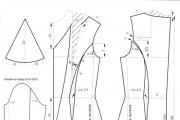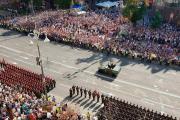Helvetius Diderot. Pedagogical views of the French materialists of the XVIII century (Helvetius, Diderot). Pedagogical theories
Denis Diderot is one of the most prominent French materialists of the 18th century. Like all representatives of this trend, Diderot was a materialist from below (in the explanation of nature) and an idealist from above (in the interpretation of social phenomena). He recognized the materiality of the world, considered movement inseparable from matter, the world is knowable, and resolutely opposed religion.
Standing on the positions of materialistic sensationalism, Diderot considered the source of knowledge to be sensations. But unlike Helvetius, he did not reduce the complex to them. the process of cognition, but recognized that its second stage is the processing of sensations by the mind. He also believed that "opinions rule the world", and mistakenly associated the possibility of reorganizing society not with a revolution, but with the issuance of wise laws and the spread of enlightenment, correct education. He outlined his thoughts on education mainly in the work “Systematic refutation of the book of Helvetius“ On Man ”.
Diderot rejected the assertion of Helvetius about the omnipotence of education and the absence of individual natural differences in people. He sought to limit the extreme conclusions reached by Helvetius. So, Diderot wrote: “He (Helvetius) says: Education means everything.
Diderot rightly asserted that all people are endowed with favorable inclinations by nature, and not just the elect. Diderot rebelled against the dominance in the schools of classical education and brought real knowledge to the fore; in high school, he believed, all students should study mathematics, physics, and the natural sciences, as well as the humanities.
Claude Adrian Helvetius - became famous as the author of the book "On the Mind", which was published in 1758 and provoked fierce attacks from all the forces of reaction, the ruling circles. The book was banned and sentenced to be burned. Helvetius developed his ideas even more thoroughly in the book “On Man, His Intellectual Abilities and His Education”. This book, written in 1769, in order to avoid new persecution, Helvetius bequeathed to be published only after his death, and it was published in 1773.
In his writings, Helvetius, for the first time in the history of pedagogy, quite fully revealed the factors that form a person. As a sensualist, he argued that all representations and concepts in humans are formed on the basis of sensory perceptions, and reduced thinking to the ability to feel.
He considered the influence of the environment to be the most important factor in the formation of man. A person is a product of circumstances (social environment) and upbringing, Helvetius argued. The atheist Helvetius demanded that public education be wrested from the hands of the clergy and made absolutely secular. Sharply condemning the scholastic methods of teaching in the feudal school, Helvetius demanded that teaching be visual and based, if possible, on personal experience child educational material, he believed, should be simple and understandable to students.
Helvetius recognized the right of all people to education, believed that women should receive education equal to men. Helvetius believed that all people with a normal physical organization have by nature equal abilities and opportunities for development. He resolutely rejected reactionary opinions about the inequality of the mental development of people due to their social origin, race or nationality. In fact, he argued, the cause of inequality is rooted in social conditions that do not allow most people to receive the right education, develop their abilities.
François Marie Voltaire (1694–1778). Known as a poet, playwright, writer, historian, philosopher. Voltaire did not leave special pedagogical works, and the ideas of education are quite rare in his work, but all his philosophy and all his ideology became the actual basis of many pedagogical concepts, ideas and attitudes in the field of upbringing and education.
In all European countries, the development of culture in the XVIII century. in one way or another took place under the sign of the ideas of the Enlightenment. But the most numerous detachment of enlighteners, shining with bright talents, was formed in France: it was from here, bearing the stamp of the French genius, that the ideas of the Enlightenment spread throughout Europe. No wonder Marx and Engels, speaking of Enlightenment XVIII in., always mean primarily the French Enlightenment.
French materialism is a philosophical trend in France of the 17th-18th centuries, inspired by the revived Epicureanism. The crisis of the Middle Ages gave rise to interest in ancient thought, including the philosophy of Epicureanism. The French materialists (Gassendi, Helvetius, Holbach, Diderot, Condorcet, La Mettrie, Cabanis, Nejon), following the Italian neo-Epicureans (Lorenzo Valla), based their philosophy on the ethics of pleasure as the antithesis of the medieval ethics of duty. Thanks to this, they received the name of Libertines or Freethinkers. The denial of God for them was not as fundamental as the criticism of the church. Their materialism sometimes bizarrely could be combined with deism. Reasonable egoism was recognized as the motive of goodness. Rational egoism was also the philosophical basis of the thought of the French physiocratic economists.
Pedagogical views of Claude Adrian Helvetius (1715-1771). In 1758, the famous book of Helvetius "On the Mind" was published. The authorities condemned and banned this book, as directed against religion and the existing system. The book was publicly burned. Helvetius went abroad and at that time wrote a new work - "On Man, His Mental Abilities and His Education" (published in 1773).
Helvetius denied innate ideas and, being a sensualist, believed that all representations and concepts in a person are formed on the basis of sensory perceptions. Great importance he gave the formation of a person under the influence of the environment, the socio-political system that prevails in the country. According to Helvetius, "the young man's new and main educators are the form of government of the state in which he lives, and the morals generated by this form of government among the people."
He pointed out that the feudal system cripples people. The Church spoils human characters, religious morality is hypocritical and inhuman. "Woe to the nations," exclaims Helvetius, "who trust the priests to educate their citizens." He believed that the time had come when the preaching of morality should be taken over by secular power. Since the existing morality is built on errors and prejudices, on religion, a new morality must be created, arising from a rightly understood personal interest, that is, one that is combined with the public interest. However, Helvetia understood the public interest from a bourgeois position. He saw the basis of society in private property.
Helvetius considered it necessary to formulate a single goal of education for all citizens. This goal is to strive for the good of the whole society, for the greatest pleasure and happiness. most citizens. It is necessary to educate patriots who are able to unite the idea of personal good and the “good of the nation”. Although Helvetius interpreted the “good of the nation” in a limited way, as a bourgeois thinker, such an understanding of the goals of education had a historically progressive character.
Helvetius argued that all people are equally capable of education, since they are born with the same spiritual abilities. This statement "about the natural equality of people" is imbued with democracy; it dealt a blow to the theories of contemporary noble ideologists who preached the inequality of people by nature, which was allegedly due to their social origin. However, Helvetius' denial of any natural differences between people is incorrect.
Helvetius believed that a person is formed only under the influence of the environment and upbringing. At the same time, he interpreted the concept of "education" very broadly. Karl Marx pointed out that by education Helvetius "understands not only education in the usual sense of the word, but also the totality of all the conditions of an individual's life ...". Helvetius stated that "upbringing makes us what we are", and even more: "Education can do anything." He overestimated both the role of education and the environment, believing that a person is a pupil of all the objects around him, those positions in which chance puts him, and even all the accidents that happen to him. Such an interpretation leads to an overestimation of natural factors and an underestimation of organized education in the formation of a person.
Helvetius believed that the scholastic school, where children are stupefied with religion, cannot educate not only real people, but also a sane person in general. It is therefore necessary to radically reorganize the school, make it secular and state-owned, and abolish the monopoly of the privileged noble caste on education. Broad education of the people is necessary, it is necessary to re-educate people. Helvetius hoped that as a result of education and upbringing, a person free from prejudice, from superstition, a true atheist patriot, a person who could combine personal happiness with the "good of nations" would be created.
The pedagogical views of Denis Diderot (1713-1784). Denis Diderot was the most prominent representative of French materialism in the 18th century. His writings were met with hostility by the authorities. As soon as his work “Letters on the Blind for the Edification of the Sighted” was published, Diderot was arrested. After his release from prison, he devoted all his energies to preparing for the publication of the Encyclopedia of Sciences, Arts and Crafts. The encyclopedia, around which he gathered the entire flower of the then bourgeois intelligentsia, played a huge role in the ideological preparation of the bourgeois French revolution.
Of all the French materialist philosophers, Diderot was the most consistent: he passionately defended the idea of the indestructibility of matter, the eternity of life, and the great role of science.
Diderot attached great importance to sensations, but he did not reduce knowledge to them, but rightly pointed out that the processing of sensations by the mind is of great importance. The sense organs are only witnesses, while the judgment is the result of the activity of the mind on the basis of the data received from them.
Diderot highly appreciated the role of education, however, in his objections to Helvetia, he did not consider education to be omnipotent. He wrote in the form of a dialogue the well-known "Systematic refutation of the book of Helvetius" Man "(1773-1774).
Here is one typical place:
"Helvetius. I regarded intelligence, genius and virtue as the product of education.
Diderot. Only education?
Helvetius. This thought seems to me still true.
Diderot. It is false, and because of this it can never be proved in a completely convincing way.
Helvetius. It was agreed with me that education has a greater influence on the genius and character of people and peoples than has been thought.
Diderot. And that's all I could agree with you on."
Diderot decisively refutes Helvetius's position that education can do everything. He believes that much can be achieved by upbringing, but upbringing develops what nature has given the child. Through education, it is possible to develop good natural inclinations and drown out bad ones, but only if education takes into account the physical organization of a person, his natural characteristics.
Descartes had an extremely strong influence on Locke's philosophy; Descartes' doctrine of knowledge underlies all of Locke's epistemological views. Reliable knowledge, taught Descartes, consists in the discernment by reason of clear and obvious relations between clear and separate ideas; where reason, by comparing ideas, does not see such relations, there can only be opinion, and not knowledge; certain truths are obtained by the mind directly or through inference from other truths, which is why knowledge is intuitive and deductive; deduction is carried out not through a syllogism, but by bringing the compared ideas to a point whereby the relation between them becomes obvious; deductive knowledge, which is composed of intuition, is quite reliable, but since it also depends in some respects on memory, it is less reliable than intuitive knowledge. In all this Locke fully agrees with Descartes; he accepts the Cartesian position that the most certain truth is the intuitive truth of our own existence.
In the doctrine of substance, Locke agrees with Descartes that the phenomenon is unthinkable without substance, that substance is found in signs, and is not known in itself; he objects only to Descartes' proposition that the soul constantly thinks, that thinking is the main feature of the soul. While agreeing with the Cartesian doctrine of the origin of truths, Locke disagrees with Descartes on the issue of the origin of ideas. According to Locke, developed in detail in the second book of the Experience, all complex ideas are gradually worked out by the mind from simple ideas, and simple ones come from external or internal experience. In the first book of the Experience, Locke explains in detail and critically why no other source of ideas can be assumed than external and internal experience. Having enumerated the signs by which ideas are recognized as innate, he shows that these signs do not at all prove innateness. So, for example, universal recognition does not prove innateness, if one can point to another explanation of the fact universal recognition, and even the very universality of the recognition of a certain principle is doubtful. Even if we admit that some principles are discovered by our mind, this does not at all prove their innateness. Locke does not at all deny, however, that our cognitive activity determined by certain laws inherent in the human spirit. He recognizes, together with Descartes, two elements of knowledge - innate beginnings and external data; the former are reason and will. Reason is the faculty by which we receive and form ideas, both simple and complex, and also the faculty of perceiving certain relations between ideas.
So, Locke disagrees with Descartes only in that he recognizes, instead of the innate potentialities of individual ideas, general laws that lead the mind to the discovery of certain truths, and then does not see a sharp difference between abstract and concrete ideas. If Descartes and Locke seem to speak of knowledge in a different language, then the reason for this lies not in the difference in their views, but in the difference in goals. Locke wanted to draw people's attention to experience, while Descartes was concerned with a more a priori element in human knowledge.
A noticeable, although less significant, influence on Locke's views was the psychology of Hobbes, from whom, for example, the order of presentation of the "Experience" was borrowed. Describing the processes of comparison, Locke follows Hobbes; with him, he asserts that relations do not belong to things, but are the result of comparison, that there are an innumerable number of relations, that more important relations are identity and difference, equality and inequality, similarity and dissimilarity, contiguity in space and time, cause and effect. In a treatise on language, that is, in the third book of the Essay, Locke develops the thoughts of Hobbes. In the doctrine of the will, Locke is in the strongest dependence on Hobbes; together with the latter, he teaches that the desire for pleasure is the only one that passes through our entire mental life and that the concept of good and evil is completely different for different people. In the doctrine of free will, Locke, along with Hobbes, argues that the will inclines towards the strongest desire and that freedom is a power that belongs to the soul, and not to the will.
Finally, a third influence on Locke must also be recognized, namely Newton's. So, in Locke one cannot see an independent and original thinker; with all the great merits of his book, there is a certain duality and incompleteness in it, which comes from the fact that he was influenced by such different thinkers; That is why the criticism of Locke in many cases (for example, the criticism of the idea of substance and causality) stops halfway.
General principles Locke's worldview boiled down to the following. The eternal, infinite, wise and good God created the world limited in space and time; the world reflects in itself the infinite properties of God and is an infinite variety. In nature individual items and individuals the greatest gradualness is noticed; from the most imperfect they pass imperceptibly to the most perfect being. All these beings are in interaction; the world is a harmonious cosmos in which each being acts according to its own nature and has its own definite purpose. The purpose of a person is the knowledge and glorification of God, and thanks to this - bliss in this and in the other world.
Much of the Essay now has only historical significance, although Locke's influence on later psychology is undeniable. Although Locke, as a political writer, often had to deal with questions of morality, he does not have a special treatise on this branch of philosophy. His thoughts about morality are distinguished by the same properties as his psychological and epistemological reflections: there is a lot of common sense, but there is no true originality and height. In a letter to Molinet (1696), Locke calls the Gospel such an excellent treatise on morality that one can excuse the human mind if it does not study this kind. "Virtue" says Locke, “considered as a duty, there is nothing else than the will of God, found by natural reason; therefore it has the force of law; as for its content, it consists exclusively in the requirement to do good to oneself and others; vice, on the other hand, is nothing but the desire to harm oneself and others. The greatest vice is that which entails the most pernicious consequences; therefore, all crimes against society are much more important than crimes against a private individual. Many actions that would be quite innocent in a state of loneliness naturally turn out to be vicious in the social order.. Elsewhere Locke says that “it is human nature to seek happiness and avoid suffering”. Happiness consists in everything that pleases and satisfies the spirit, suffering - in everything that disturbs, upsets and torments the spirit. To prefer transient pleasure to lasting, permanent pleasure is to be the enemy of your own happiness.
16. The theory of "social contract" T. Hobbes and J.-J. Rousseau.
J.-J. Rousseau (1712-1778) was one of the largest representatives
French Enlightenment. His theory of the Social Contract is essentially
differed both from the views of Hobbes and from the views of Locke.
The natural state of people Rousseau interprets the state of the primitive
harmony with nature. Man does not need any social restraints,
neither in morality, nor in systematic labor. The ability to self-preserve
keeps him from the state of "war of all against all." However, the population
is growing, geographical conditions are changing, abilities are developing and
needs of people, which ultimately leads to the establishment of private
property. Society is stratified into rich and poor, powerful and
oppressed, who are at enmity with each other. Inequality is evolving
gradually: first wealth and poverty are recognized, then power and
defenselessness, finally - domination and enslavement. Society needs
civil world - a social contract is concluded, according to which the authorities
above society goes to the state. But at the core of state power,
According to Rousseau, lies the will and freedom of each individual. This
freedom and will remain absolute, unlimited even after the conclusion
Social contract. Therefore, Rousseau puts forward his famous thesis about
that the bearer and source of power is the people, who can and
must overthrow the authorities that violate the terms of the Social Contract.
It is not the state that is sovereign, the people are superstitious. People make laws, change them,
accepts new ones.
The main task that the Social Contract is intended to solve is, according to
Rousseau's opinion is to find a form of association that protects and
protects with all common strength the person and property of each of the members
association, and through which each, uniting with all, submits,
however, only to himself and remains as free as before.
Considering the state as a product of the Social Contract, the product of
reasonable will of the people, or rather, a human institution or even
invention, Rousseau proceeded from the fact that each person transmits to the general
property and places his personality and all
strength. As a result, "for us all together, each member turns into
an inseparable part of the whole." This collective whole, according to Rousseau, is
nothing more than a legal entity. Previously, it was called "civil
community". Later - "Republic or Political body". Members of this
political organism is called "State, when it is passive,
Sovereignty when it is active, Power - when compared with it
similar".
The state is considered by Rousseau as a "conditional personality", whose life
consists in the union of its members. His main concern, along with
self-preservation is concern for the common good, for the good of the whole society,
people. Published laws and law play a huge role in this.
Rousseau puts forward and develops the idea of direct popular government because,
according to the Social Contract, "only the general will can govern the forces
state in accordance with the purpose of its establishment, which is the general
The people, the thinker argues, cannot deprive itself of the inalienable
the right to legislate even if he wanted to. Laws are always
are acts of the general will. And no one, not even the sovereign, can be higher than them.
Laws are only those acts that are directly adopted or
approved by the people themselves through a referendum.
Along with the exclusive right to adopt laws, the people have
also the inalienable right to resist tyrants. Kings, wrote on this
about Rousseau, they always "want to be unlimited." Although they have long
asserted that "the most the best remedy to become such is to win love
their subjects," however, this rule at the courts has always caused and will
cause only ridicule"
The power arising from the love of the subjects is undoubtedly the greatest, but it
unstable and conditional. Therefore, "sovereigns are never satisfied with it."
The personal interest of any rulers is, first of all, "that the people
was weak, poor and could never resist them. "Of course, he notices
thinker, assuming that the subjects will always remain
completely submissive that the sovereign would be interested in the people
mighty, "that this might, being his own, might make
formidable to the neighbors". But since the interest of the people has "only
secondary and subordinate meaning" and since both assumptions
incompatible, it is natural that "sovereigns always prefer to follow
to the rule that is directly beneficial to them.
Thus, any ruler always retains his own,
different from the popular, interest and temptation to concentrate in one's own hands
as much state power as possible. The latter leads not only to
that "the distance between the sovereign and the people is becoming too great and
the state begins to lack internal communication", but also to the fact that in
the political regime establishes signs of open disregard for the rights and
freedom of the masses, signs of despotism. Under these conditions, as follows from
The social contract according to Rousseau, the people can realize their natural
the right to resist. At the same time, he concludes, the uprising, which
"results in the assassination or dethronement of some sultan, this
an act as legitimate" as those acts by which it is only
that disposed of the life and property of his subjects. "Only by force
he held on, only his strength overthrows him.
These views are radical and revolutionary. It is they
underlay the ideology of the most extreme group of revolutionaries of the times
French Revolution - Jacobins and served as a justification for the Jacobins
From all that has been said about the natural law theory of origin
state and law, it follows that its supporters proceed from the fact that the people
has a natural, inalienable right not only to consciousness
state on the basis of the Social Contract, but also to protect it. Despite
the fact that the scientific nature of the contract theory was assessed rather ambiguously
and contradictory, up to the complete denial of its historical
independence, however, some aspects of this concept have found
its real embodiment in the practice of state building.
An example of this is the United States of America, which in its
constitutions legally fixed the contract between the peoples included in their
composition, and determined the goals of this agreement: the establishment of justice, the protection
internal peace, organization of joint defense, promotion of common
welfare.
Thomas Hobbes (1588-1649), 17th century English philosopher, in his famous
treatise "Levithian, or matter, form and power of the state of the church and
civil" for the first time, perhaps, outlined the theory of the social contract in
definite, clear and rationalistic (i.e. based on
arguments of reason) form. According to Hobbes, the emergence of the state
precedes the so-called natural state, the state of the absolute,
unlimited freedom of people, equal in their rights and abilities.
People are equal among themselves and in the desire to dominate, to possess the same
same rights. Therefore, the state of nature for Hobbes is in the full sense
"a state of war of all against all." The absolute freedom of man -
desire for anarchy, chaos, uninterrupted struggle, in which justified and
killing a person by a person.
In this situation, the natural and necessary solution is
restriction, curbing the absolute freedom of everyone in the name of good and order
everyone. People must mutually limit their freedom in order to exist in
state of the social world. They agree with each other about it.
limitation. This mutual self-restraint is called social
contract.
By limiting their natural freedom, people at the same time transmit
powers to maintain order and supervise compliance with the contract of a particular
another group or individual. This is how the state arises
which is sovereign, that is, independent of any external or internal
forces. The power of the state, according to Hobbes, must be absolute,
the state has the right to take any measures in the interests of society as a whole
coercion against its citizens. Therefore, the ideal state for Hobbes was
absolute monarchy, unlimited power in relation to society.
Political views of the French materialists of the Enlightenment (C. Helvetius, P. Holbach, D. Diderot)
The most important representatives of French materialism of the XVIII century. were D. Diderot, K. Helvetius, P. Holbach. Diderot, Holbach and Helvetius stood in the positions of the advanced, democratic-minded sections of the bourgeoisie in the anti-feudal camp.
Danny Diderot (1713-1784) supervised the publication of the famous "Encyclopedia", which became a kind of printed organ of the French Enlightenment. "Encyclopedia" played an important role in promoting the ideas of enlightenment and preparing the Great French bourgeois revolution.
The socio-political doctrine of Diderot is based on a number of provisions of the theory of natural law. According to her views, people lived originally in a natural (pre-state) state; they were equal among themselves and enjoyed complete independence. This description, in many respects coinciding with the previous teachings of the school of natural law, Diderot sought to supplement with facts from primitive history. In his interpretation, the state of nature turned out to be not so much a period of isolated existence of individuals as an era of primitive collectives with social ownership of the means of labor.
With the advent of private property and the spirit of profit, this "source of all vices", natural equality disappeared, and people were divided into rich and poor. Diderot cited the Inca society as one example of the state of nature.
State power arises as a result of a contract that people have concluded among themselves in order to ensure their happiness. Diderot saw the social contract not as a real agreement that took place in the past, but as a constantly renewed consent of citizens to the submission of the existing authority.
Such an agreement (treaty) serves as the basis only for regular, well-organized states; tyranny arises from violence, treachery and deceit. Diderot was convinced that the source of state power is the people, while rulers and sovereigns are just its holders. As he wrote in the "Encyclopedia", the crown and public authority - "the essence of things, the owner of which is the whole nation as a whole." If the sovereign refuses to provide happiness to the citizens, then the nation is not connected with him by any contract and has the right to conclude a new one with another sovereign. From this Diderot deduced the right of peoples to resist tyrants and destroy a political system that does not correspond to the general will of the nation.
Diderot believed, however, that the destruction of the feudal system was quite possible peacefully, with the help of legislative reforms and moral education people. The political program outlined in his writings provided for the abolition of serfdom and the allocation of land to the peasants, the abolition of estate privileges, the granting of citizens the right to participate through their deputies in government, the protection of personal security, freedom of speech, the press, trade and crafts. In order to reach a compromise with the nobility, capable of ensuring a peaceful course of social transformations, Diderot proposed to preserve the landownership.
However, Diderot did not at all call for the socialization of property. He was a supporter of private property of small and medium sizes, and his demands did not extend beyond the utopian projects of equal distribution of wealth. The task of politics is not to eliminate private property, but to mitigate the excessive disparity between luxury and poverty. For this, Diderot believed, it is necessary to find a social mechanism that could force the owner, pursuing private interests, to bring as much benefit to society as possible to his fellow citizens. Diderot believed that the implementation of these measures would bring with it the flourishing of the individual and social harmony.
Diderot gave his political sympathies to the republic, but, like many other enlighteners, he considered it unsuitable for the vast territory of France. He left the question of the future state structure of the country essentially open.
The concept of education as a means of transition to a reasonable and just social system was developed by Claude Adrian Helvetius (1715-1771). The main works of the thinker are called "On the Mind" and "On the Man".
The socio-political doctrine was formed in a polemic with Montesquieu about the causes that determine social life. Helvetius excluded geographical factors from these causes. Refuting the teachings of Montesquieu, he argued that the differences in laws and customs are due exclusively to the social environment. People everywhere are born with equal abilities and inclinations, and they begin to differ only under the influence of the family, the laws of upbringing and the immediate environment. The emergence of the state and Helvetius deduced from public interests.
The socio-political doctrine of Helvetius, in general, was idealistic and metaphysical, because among the reasons causing changes in legislation and customs, he puts forward the reasons of the spiritual order - the form of government, the influence of dominant opinions.
The idealism of social views of Helvetius was especially clearly manifested in his interpretation of the transition to a rational organization of society. Helvetius emphasized the importance of positive laws in establishing a "rational order". The views of the people, he argued, can only be changed if the legislation is changed. Exaggerating the possibilities of legal regulation of social relations, Helvetius brought the postulates of the legal worldview to extreme conclusions.
Helvetius considered the purpose of legislative reforms to be the creation of a legal order that would guarantee the conformity of personal and public interests. It is necessary to organize relations between people in such a way that it becomes profitable for each individual to do good for fellow citizens. The state must protect the interests of the majority.
The political ideal of the enlightener is a republic. Arguing with Montesquieu, Helvetius opposed the preservation of the monarchy (even if power was retained) and expressed the idea of the possibility of forming a federal republic in France.
The concept of Helvetius was a significant step forward in terms of theoretical understanding of the social nature of man, his consciousness, political life and mores.
The systematization of the teachings of the French enlighteners was completed by Paul Holbach (1723-1789). He wrote a cycle of atheistic works, as well as the treatise "The System of Nature", which was a kind of code of materialistic philosophy of the 18th century. His political and legal views, he summarized the book "Natural Politics".
In systematizing the concepts created by representatives of the democratic movement in the enlightenment, Holbach was forced to take into account the interpretations that French materialism had acquired from the supporters of the idea of socialization of property. He consistently and methodically excluded from the ideology of enlightenment all provisions that could give rise to communist conclusions. Therefore, Holbach did not support either Diderot's ideas about the communist life of ancient peoples, or the teachings of Helvetius on the equality of the mental abilities of people, or their democratic sympathies. By revisiting these ideas, Holbach strengthens the case for private property and imbues his doctrine with the postulates of natural law. Property, he argued, has always existed and is one of the eternal, inalienable rights of man. In turn, property inequality entails inequality of civil rights. Holbach's political program reproduced the requirements characteristic of the liberal enlightenment (separation of powers, constitutional monarchy).
Helvetius: Seeing the enormous mental inequality of people, we must first of all recognize that minds are as different as bodies ... But this reasoning is based only on analogy. The apparent inequality between the minds of different people cannot be taken as evidence of their unequal capacity for mental development... What is the mind itself? The ability to notice similarities and differences, correspondences and inconsistencies between different objects.
Diderot: But is this ability innate, or is it acquired?
Helvetius: Born.
Diderot: And is it the same for all people?
Helvetius: All normally organized people.
Diderot: And what lies at the basis of it?
Helvetius: physical sensitivity.
Diderot: What about sensitivity?
Helvetius: It is an ability whose action changes only under the influence of upbringing, accidents and interest.
A .: So, here Helvetius (more precisely, expounding his views of Diderot) points to three factors that lead to the inequality of minds with the initial equality of the natural abilities of a person. Next, we will consider them in more detail.
Diderot: Does the organization, unless it is monstrously perverted, play no role here?
Helvetius: No.
Diderot: What do you see as the difference between man and animal?
Helvetius: In the organisation...
Diderot: And you don't see all your inconsistency?
Helvetius: What other inconsistency?
Diderot: You reduce the difference between the two extreme links of the animal chain - man and animal - to a difference in organization and use the same reason to explain the difference between dogs, but reject it when it comes to the difference between people in terms of intelligence, insight and intelligence ... .
A: So, even purely logically, if the difference between two animals in terms of their mental functions is due to the difference in their nervous organization, then why not assume this in relation to people who are a link in the chain of living organisms?
Helvetius: I considered intelligence, talent and virtue as a product of education.
Diderot: Imagine five hundred newborn babies; you are trusted to raise them as you see fit. Tell me, how many of them will you make geniuses? Why not all five hundred? Think carefully about your answers, and you will be convinced that in the end they will lead you to a difference in organization, this primary source of laziness, frivolity, stubbornness and other vices or passions ... Prince Golitsyn has two children: a kind, meek and simple-hearted boy and a sly, cunning girl, always getting her way in a roundabout way. Their mother is devastated by this. Whatever she did to teach her daughter to be frank, and all to no avail. Where does this difference come from between two children, barely four years old, who were raised and cared for in the same way by their parents? Whether Mimi corrects herself or not, her brother Dmitry will never be able to maneuver among court intrigues like she does. The teacher's lesson can never be compared with the lesson of nature.
Helvetius: No one receives the same education, for everyone is mentors ... and the form of government under which he lives, and his friends, and his mistresses, and the people around him, and the books he read, and, finally, chance, that is, an infinite number of events, the cause and concatenation of which we cannot indicate due to ignorance of them.
S: And which one is right?
A.: As has happened many times in the history of scientific thought, both opinions reflect only different sides single process. Later Sergei Leonidovich Rubinshtein would express this pattern in the classical formula: "External causes act through internal conditions." Of course, Diderot is right when he speaks of differences in innate predisposition, inclinations. But Helvetius is also right, who emphasizes the role external conditions, including the "form of government" in the state, in the development of people's abilities.
Helvetius: Peoples groaning under the yoke of unlimited power can have only short-term successes, only flashes of glory; sooner or later they will fall under the rule of a free and enterprising people. But even if we assume that they will be spared from this danger due to exceptional circumstances and situation, then bad management is already enough to destroy them, depopulate and turn them into a desert [Ibid., p. 632].
A.: Helvetius is also right in that even with the supposedly "same" upbringing of two twins, this upbringing is still not the same: and this was proved by subsequent empirical studies of the psychology of the upbringing and development of twins.
Helvetius: Chance plays an important role in the formation of character... Genius is the product of chance ... It is chance that puts known objects before our eyes, therefore, it causes us to have especially successful ideas and sometimes leads us to great discoveries.
Chance is the master of all inventors.
Diderot: Mister? Say better "servant", for he serves them, and not vice versa. Do you think that chance led Newton from the falling pear to the motion of the moon, and from the motion of the moon to the system of the universe? So chance would lead to the same discovery for anyone else? Newton himself thought of it differently. When asked how he came to his discovery, he answered: "Through reflection" [Ibid.].
A: Again, the truth lies somewhere in the middle. And the case plays an important role in the apparent sudden "enlightenment" of the scientist, but only on condition that he had previously thought about it for a long time. This is shown by modern research in the psychology of thinking.
Helvetius: Competition creates geniuses, and the desire to become famous creates talents ... The inequality of minds comes not so much from the too unequal distribution of the gifts of chance, but from the indifference with which they are accepted.
Diderot: My dear philosopher, don't say that; say rather that these reasons give them the opportunity to manifest themselves, and no one will argue with you.
Competition and desire do not create genius where there is none.
There are a thousand things that seem to me so beyond my powers that neither the hope of winning the throne, nor even the desire to save my life, would induce me to seek them, and there was not a moment in my whole life when my feelings and thoughts would shake me in this. persuasion.
A .: And again, both are right: passion plays an extremely large role in the development of abilities; very often a person is so in love with his own business that he acquires the necessary knowledge and skills as if effortlessly and quickly develops his abilities; but there is also an opposite picture, when a child is forced to study by force at first, and despite this, geniuses appear; a classic example is Paganini, who was literally forced by his father to play the violin as a child.
I will not dissemble: despite the fact that in these dialogues the extreme positions of both authors appear, both of them in their works often express themselves in the aforementioned compromise sense and therefore their views should be considered only as certain tendencies in understanding this or that problem...
Well, we went over the main problems of the French empirical psychology of consciousness of the 18th century, which developed the problem of experiential origin mental functions, emphasized the role of internal conditions (needs, activity of the subject, abilities, and so on) in the functioning of consciousness. This distinguished it from the English associative psychology that you and I discussed earlier.
S: What's going on in Germany?
A .: But we will talk about German empirical psychology a little later, when we touch on the problem of unconscious mental processes, because this problem was developed mainly by German-speaking authors ...
Literature
1. Locke J. Experience about human understanding // J. Locke. Op. In 3 vols. M., 1985. T. 1. S. 78-582.
2. Bykhovsky B.E. George Berkeley. M., 1970.
3. Berkeley J. Experience of a new theory of vision // J. Berkeley. Works. M., 1978. S. 49-136.
4. Yum D. Treatise on human nature, or an attempt to apply the method of reasoning based on experience to moral subjects // D. Yum. Op. In 2 vols. M., 1966. T. 1. S. 77-788.
5. Narsky I.S. David Hume. M., 1973.
6. Yum D. Abridged presentation of the "Treatise on Human Nature" // D. Yum. Works. In 2 vols. M., 1966. T. 1. S. 789-810.
7. Yum D. Research on human cognition // D. Yum. Op. In 2 vol. M., 1965. T. 2. S. 5-169.
8. Gartley D. Reflections on man, his structure, his duty and hopes // English materialists of the 18th century: coll. prod. In 3 vols. M., 1967. T. 2. S. 193-371.
9. Zhdan A.N. History of psychology from antiquity to the present day. M., 1990.
10.Zenger S. J. St. Mill, his life and works. SPb., 1903.
11.Mill J.St. Logic system. M., 1914.
12.Yaroshevsky M.G. History of psychology. M., 1985.
13.Koenig E. Wilhelm Wundt. His philosophy and psychology. SPb., 1902.
14.Ebbinghaus G. Fundamentals of psychology. SPb., 1912.
15.Wertheimer Michael. Max Wertheimer; Gestalt Prophet// Gestalt Theory. 1980 Vol. 2. N 1. P. 3-17.
16.Rubinshtein S.L. A few remarks in connection with the article by A.A. Vetrov "Productive thinking and association" // Issues of psychology. 1960. No. 1. C. 156.
17.Boguslavsky V.M. Lametrie. M., 1977.
18.Boguslavsky V.M. Scientist, thinker, wrestler // J.O. Lametrie. Works. M., 1983. S. 3-57.
19.Lametrie J.O. Treatise on the Soul: The Natural History of the Soul // Ibid. pp. 58-143.
20.Lametrie J.O. Man-machine // Ibid. pp. 169-226.
21.Lametrie J.O. Man-plant / / Ibid. pp. 227-240.
22.Lametrie J.O. A summary of philosophical systems to facilitate understanding of the treatise on the soul // Ibid. pp. 144-168.
23.Boguslavsky V.M. Etienne Bonnot de Condillac. M., 1984.
24.Kondillak E.B. Treatise on sensations // E.B. Kondillak. Op. In 3 vols. M., 1982. T. 2. S. 189-399.
25.Didro D. Consistent refutation of the book of Helvetius "On Man" // D. Diderot. Works. In 2 vols. M., 1991. T. 2. S. 342-506.
26.Helvetsy K.A. About Mind // Anthology of World Philosophy. In 4 vols. M., 1970. T. 2. S. 621-635.
27.Ben A. Psychology// The main directions of psychology in classical works. Associative psychology. G. Ebbinghaus. Essay on psychology. A. Ben. Psychology. M., 1998. S. 209-511.
28.Spencer g. Foundations of psychology// The main directions of psychology in classical works. Associative psychology. G. Spencer. Foundations of psychology. T.Ziegen. Physiological psychology in 14 lectures. M., 1998. S. 11-309.
Pedagogical views of Claude Adrian Helvetia(1715-1771). In 1758, the famous book of Helvetius "On the Mind" was published. The authorities condemned and banned this book, as directed against religion and the existing system. The book was publicly burned. Helvetius went abroad and at that time wrote a new work - "On Man, His Mental Abilities and His Education" (published in 1773). Helvetia
believed that all representations and concepts in humans are formed on the basis of sensory perceptions. He attached great importance to the formation of man under the influence of the environment. He pointed out that the feudal system cripples people. The church corrupts human characters. Helvetius considered it necessary to formulate a single goal of education for all citizens. This goal is to strive for the good of the whole society, for the greatest pleasure and happiness of the greatest number of citizens. Helvetius argued that all people are equally capable of education, since they are born with the same spiritual abilities. Helvetius believed that a person is formed only under the influence of the environment and upbringing. At the same time, he interpreted the concept of "education" very broadly. By education, Helvetia “understands not only education in the usual sense of the word, but also the totality of all the conditions of an individual's life ...”1. Helvetius stated that "upbringing makes us what we are", and even more: "Education can do anything." Broad education of the people is necessary, it is necessary to re-educate people. G. hoped that as a result of education and upbringing, a person free from prejudices would be created. Pedagogical views of Denis Diderot (1713-1784). His writings were met with hostility by the authorities. As soon as his work “Letters on the Blind for the Edification of the Sighted” was published, Diderot was arrested. Diderot decisively refutes Helvetius's position that education can do everything. He believes that much can be achieved by upbringing, but upbringing develops what nature has given the child. Through education, it is possible to develop good natural inclinations and drown out bad ones, but only if education takes into account the physical organization of a person, his natural characteristics.
Diderot believed that not only the elite had good natural inclinations; he, on the contrary, argued that the people are much more often the bearer of talents than representatives of the nobility.
Like Helvetius, Diderot strongly criticized the French feudal system of education, emphasizing that primary schools in the hands of the clergy neglect the education of children from the people, and the privileged secondary schools of the classical type instill only an aversion to the sciences and make insignificant results.
Denis Diderot(1713-1784), French philosopher, educator, writer. He studied at the Jesuit College, received the title of Master of Arts. The first philosophical writings of Diderot were burned by the decision of the French parliament (for criticizing the Christian religion and the church in the spirit of deism, he was arrested for spreading "dangerous thoughts"). In 1773-74. visited Russia, at the suggestion of Catherine II participated in the development of a democratic program of upbringing and education in Russia. Wrote the "Plan of the University, or School of Public Teaching of Sciences for the Russian Government".
The most prominent representative of French materialism of the 18th century. Inspirer, organizer and one of the main authors of the famous "Encyclopedia, or explanatory dictionary sciences, arts and crafts", whose main task was to promote natural science knowledge - the strongest weapon against traditional ideology. D. Diderot highly appreciated the role of education in shaping a person. He called for taking into account his anatomical and physiological features in the process of education, as well as social conditions in which personality is formed. Diderot outlined new principles for the organization of education: the universality and free of charge of education, its classlessness, secularism. He expressed his views on the content of the school curriculum, taking into account the interconnection and interdependence of sciences. He called on scientists to compile evidence-based textbooks, offered a differentiated approach to learning, and encouraged capable students. He paid special attention to the selection of teachers who, in his opinion, had all the necessary qualities. To these qualities, he attributed, first of all, a deep knowledge of the subject, honesty, responsiveness and love for children.














